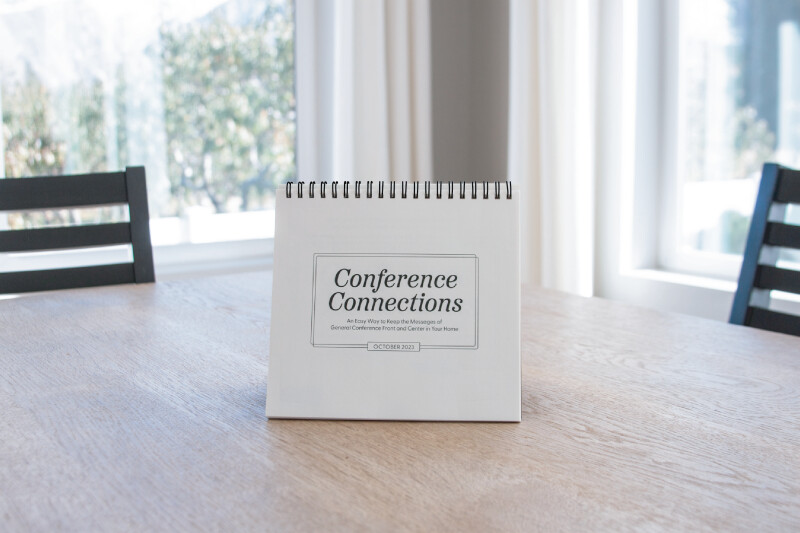There are always so many new personal stories shared in general conference. One that I enjoyed and related to in the October conference was President Emily Belle Freeman’s story of breaking her ankle just before taking a trip to Jerusalem to walk the “Jesus Trail.”
Beyond her message of hope and faith that Christ can help us walk the covenant path even if we feel broken, however, I enjoyed reading her added insights and thoughts in the footnotes of her talk. You can tell she has a seminary teaching background, and her additional comments made her message feel so personal and applicable. Here are a few footnotes that stood out to me in particular, including the five-finger promise.
1. Enoch
After sharing her story of being pulled on her knee scooter by her guide along the “Jesus Trail,” President Freeman points to the story of Enoch—a prophet who felt inadequate and broken. After reminding us that, like Enoch, the Lord does not leave us alone to walk His path, footnote 1 adds this additional insight:
“The people of Enoch had gone astray, they had denied Christ, and they ‘sought their own counsels in the dark’ (see Moses 6:27–28). In a time when he had lost faith in humanity, Enoch turned to the Lord for guidance. This call to Enoch is the same call the Lord extends to all of us: ‘Walk with me’ (Moses 6:34; see also Matthew 11:28). But maybe, like Enoch, you are unsure if you can walk this path in your condition. Maybe you feel hindered in some way. Perhaps the very reason we need to walk the covenant path is because of our condition, because we are hindered in some way and we need His help.”
This additional reminder of our need for the Lord’s help and companionship rounds out the story of Enoch and President Freeman’s own story, bringing it close to home and reminding us that we are all broken in some way and that we all need to walk Christ’s path and receive His help.
2. The five-finger promise
A little later in her talk, President Freeman identifies five promises the Lord made to the prophet Jacob, reminding me of the message she shared shortly after beginning her service as Young Women General President:
- I am with you.
- I will keep you safe.
- I will bring you home again.
- I will not leave you.
- I will keep my promise to you.
In a touching footnote, she adds, “My girls want to whisper this five-finger promise to their children (my grandchildren) every morning—a reminder of a Father in Heaven who is divinely aware of each of His children.”
What a beautiful idea! We sing “I Am a Child of God” and teach other important truths to our children, but I loved this personal application and suggestion. President Freeman also adds this reminder of what the Lord told Jacob in addition to the five promises:
“The Abrahamic covenant was also a significant emphasis of that night (see Genesis 28:10-22). These elements of the Abrahamic covenant play a central role in our lives and in the gospel of Jesus Christ: (1) the promise of an eternal inheritance (see Genesis 28:13); (2) eternal posterity (Genesis 28:14); and (3) the blessing and responsibility to bless all nations of the earth (Genesis 28:14).”
I appreciated these reminders of how much the Lord has promised us!
3. The Path
President Freeman’s talk centered around following the covenant path as we build a relationship with God. In footnote 18, she adds this simple clarification and reminder about what a path is and how we can walk it with our Savior:
“A path is often defined by key characteristics such as guideposts or mile markers. It is a way to make sure you are on the right trail or making progress in the right direction. A relationship also can be defined by key characteristics. Some of these include expectation (see Jeremiah 29:11; Doctrine and Covenants 132:7); submissiveness (see Mosiah 3:19; Alma 7:23; 13:28); humility; obedience; patience; yielding; trust (see Proverbs 3:5); and love (see Romans 8:31–39).”
Definitions of words can be extremely helpful in understanding deeper meanings of the scriptures, and I think this one is no exception. I love that as I re-read President Freeman’s message with this definition in mind I can think of the covenant path in this way—a series of guideposts leading me in the right direction and to the destination I desire. And my covenant relationship with my Heavenly Father and Savior Jesus Christ can improve as I work on the characteristics listed.
President Freeman adds one more thought of encouragement on this topic in footnote 33. “A good friend reminded me that a call to action is important in any relationship.” How important to include this thought—My best and most rewarding relationships are the ones with people who I know love me deeply and who also encourage me to live up to my full potential. Knowing that President Freeman felt this thought from a friend important enough to share with all of us in her footnotes made her plea more powerful and personal:
“Begin where you are. Don’t let your condition hinder you. Remember, pace or placement on the path are not as important as progress. Ask someone you trust who is on the covenant path to introduce you to the Savior they have come to know. Learn more of Him. Invest in the relationship by entering into covenants with Him. It doesn’t matter your age or your condition. You can walk with Him.”
4. Calls of Encouragement
President Freeman’s final footnote includes a quote from Martin Luther that I think paints a beautiful picture of what she has been trying to describe throughout her talk:
“The kingdom of God … is like a besieged city surrounded on all sides by death. Each man has his place on the wall to defend and no one can stand where another stands, but ‘nothing prevents us from calling encouragement to one another’” (Martin Luther, in Lewis William Spitz, The Renaissance and Reformation Movements [1987], 335).
I love thinking of myself as part of a group of people standing alone together, defending our faith as we encourage each other to stand strong, or as President Freeman put it,
“Thankfully, we walk this path together, calling out encouragement along the way. As we share our personal experiences with Christ, we will strengthen personal devotion. Of this, I bear witness in the name of Jesus Christ, amen.”
▶ You may also like: How this general conference journal might help improve your study



